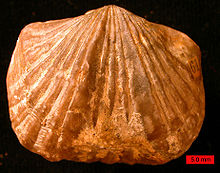- Orthida
-
Orthida
Temporal range: Early Cambrian (Botomian)–Mid Permian
Vinlandostrophia ponderosa (Upper Ordovician). Scientific classification 
Kingdom: Animalia Phylum: Brachiopoda Class: Rhynchonellata Order: †Orthida Suborders - Brachiopods which appeared during the Early Cambrian period and became very diverse by the Ordovician, living in shallow-shelf seas. Orthids are the oldest member of the subphylum Rhynchonelliformea , and is the order from which all other brachiopods of this group stem.[1] Physically they are usually strophic, with well-developed interareas. They also commonly have radiating ribs, sulcus, and fold structures. Typically one valve, often the brachial valve, is flatter than the other. The interior structure of the brachial valves are usually simple. In shape they are sub-circular to elliptical, with typically biconvex valves.
There is some debate over the forms that first appear of this order as to how they should be classified. However they begin to differentiate themselves by the late Early Cambrian period, and by the late Cambrian period had diversified into numerous varieties and reach 2 to 5 cm in width. Specimens from the late Cambrian to the earliest Ordovician exhibit shells with rounded and pointed pedical valves, with sharp to obtuse extremities and ridges that are fine to course. Punctate shells appear during the mid-Ordovician, which establish the suborder Dalmanellidina. The Ordovician is a productive period which gives rise to numerous genera in this order, however they started to become greatly reduced by the end Ordovician extinction event. Both the impunctate and punctate survived through to the early Devonian Eventually though, only the punctate lived on, and would play a minor role in benthic ecosystems until the late Permian when they became extinct.[2]
Notes
- ^ Patzkowsky, Mark E (2003). Orthida. McGraw-Hill Encyclopedia of Science & Technology Online. Retrieved on July 24, 2006.
- ^ Kazlev, M. Alan (1999). Order Orthida. Paleos, Invertebrates. Retrieved on July 24, 2006.
Categories:- Brachiopods
Wikimedia Foundation. 2010.
Look at other dictionaries:
Orthida — Hesperorthis martinsonii (Bassett, 1974) Zeitraum Kambrium bis Perm 540 bis 250 Mio. Jahre Systematik … Deutsch Wikipedia
Orthida — Ọrthida, fossile Ordnung der schlosstragenden Armfüßer, vom Kambrium bis zum Perm, mit meist bikonvexen Klappen und geradem Schlossrand. Gattungen Orthis (grob berippt; Ordovizium), Platystrophia (wesentlich dicker; Mittelordovizium bis… … Universal-Lexikon
lamp shells — ▪ animal Introduction also called brachiopod, any member of the phylum Brachiopoda, a group of bottom dwelling marine invertebrates. They are covered by two valves, or shells; one valve covers the dorsal, or top, side; the other covers… … Universalium
Arbre phylogénétique (Phonorozoa) — Brachiopoda (classification phylogénétique) Cette page a pour objet de présenter un arbre phylogénétique des Brachiopoda (ou Brachiozoa, ou Phoronozoa, ou encore Brachiopodes), c est à dire un cladogramme mettant en lumière les relations… … Wikipédia en Français
Arbre phylogénétique (Phoronozoa) — Brachiopoda (classification phylogénétique) Cette page a pour objet de présenter un arbre phylogénétique des Brachiopoda (ou Brachiozoa, ou Phoronozoa, ou encore Brachiopodes), c est à dire un cladogramme mettant en lumière les relations… … Wikipédia en Français
Brachiopoda (Classification Phylogénétique) — Cette page a pour objet de présenter un arbre phylogénétique des Brachiopoda (ou Brachiozoa, ou Phoronozoa, ou encore Brachiopodes), c est à dire un cladogramme mettant en lumière les relations évolutives complexes (relations groupes ancestraux… … Wikipédia en Français
Brachiopoda (classification phylogenetique) — Brachiopoda (classification phylogénétique) Cette page a pour objet de présenter un arbre phylogénétique des Brachiopoda (ou Brachiozoa, ou Phoronozoa, ou encore Brachiopodes), c est à dire un cladogramme mettant en lumière les relations… … Wikipédia en Français
Brachiopoda (classification phylogénétique) — Cette page a pour objet de présenter un arbre phylogénétique des Brachiopoda (Phoronozoa, Brachiozoa, Brachiopodes, Phoronozoaires), c est à dire un cladogramme mettant en lumière les relations de parenté existant entre leurs différents groupes… … Wikipédia en Français
ТИП ПЛЕЧЕНОГИЕ (BRACHIOPODA) — Это группа исключительно морских одиночных донных животных, имеющих двустворчатую раковину и ведущих, прикрепленный образ жизни. Положение брахиопод в системе животного мира было долгое время неясным и спорным. На основании… … Биологическая энциклопедия
Geologic time scale — This clock representation shows some of the major units of geological time and definitive events of Earth history. The Hadean eon represents the time before fossil record of life on Earth; its upper boundary is now regarded as 4.0 Ga.[1] Other… … Wikipedia
- Brachiopods which appeared during the Early Cambrian period and became very diverse by the Ordovician, living in shallow-shelf seas. Orthids are the oldest member of the subphylum Rhynchonelliformea , and is the order from which all other brachiopods of this group stem.[1] Physically they are usually strophic, with well-developed interareas. They also commonly have radiating ribs, sulcus, and fold structures. Typically one valve, often the brachial valve, is flatter than the other. The interior structure of the brachial valves are usually simple. In shape they are sub-circular to elliptical, with typically biconvex valves.
